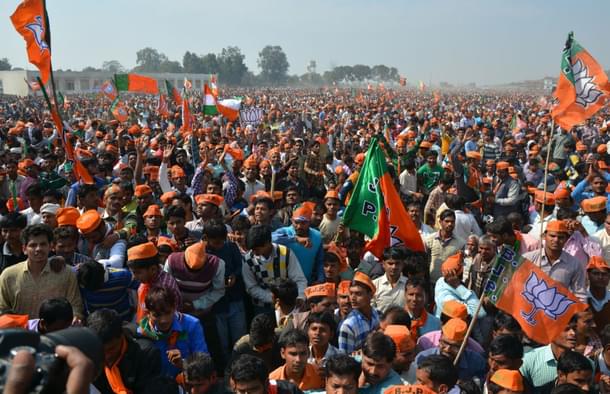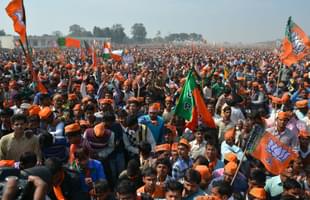Current Affairs
Morning Brief: Poll of Polls Predicts BJP Win; Keep Military Out Of Politics: Army Chief; Plot To Kill Theresa May Foiled
Swarajya Staff
Dec 07, 2017, 06:20 AM | Updated 06:20 AM IST
Save & read from anywhere!
Bookmark stories for easy access on any device or the Swarajya app.


Good morning, dear reader! Here’s your morning news and views brief for today.
Poll of Polls Predicts BJP Victory In Gujarat: The Bharatiya Janata Party (BJP) is headed for a victory in Gujarat assembly elections, but with a smaller margin than last time, said a poll of polls that aggregates three surveys ahead of the assembly elections. The poll shows the BJP getting 105-106 of the state's 182 seats, well over the halfway mark of 92 the party needs to form government a fifth consecutive time. The aggregate of three opinion polls shows the Congress settling for the opposition benches again with 73-74 seats. The India TV opinion poll predicts that the BJP will get between 106 and 116 seats, the upper end of which range will mean the party equalling its tally last time. The Times Now survey shows the BJP getting 111 seats while the ABP-CSDS opinion poll predicts the lowest tally for Gujarat's ruling party at between 91 and 99 seats. All three opinion polls show the Congress bettering last time's performance.
Military Must Be Kept Out Of Politics, Says Army Chief Rawat: India's military should be kept away from politics, Army Chief Bipin Rawat said on Wednesday. "Of late we have been seeing that politicisation of military has been taking place. We operate in a very secular manner. We have a vibrant democracy, where the military should stay far away from the polity," General Rawat said. Rawat was speaking at an event organised by the United Service Institution. "Defence forces in India will do well if they remain above (politics). Where they are expected to remain, and do not meddle with politics..." he said. General Rawat has been one of the most outspoken generals since taking over as the Army Chief of the 1.2-million strong force nearly a year ago. The Army Chief also said the norm in the “good old days” was never to discuss women and politics in the forces. However, these subjects were gradually “inching” their way into the discourse and this should be avoided, he added.
New Maharashtra Push To Transform Villages: The Maharashtra government has signed 34 MoUs with leading corporate houses to take ahead its ambitious project of social transformation of 1,000 villages across the state. With a budget of Rs 335 crore, the initiative to promote public-private partnership aims at benefiting more than 75 lakh people. It also envisages creation of 31,000 water tanks in remote villages to tackle water scarcity. Under the banner of Village Social Transformation Foundation the government has initiated the work in 310 villages and intends adding 300 more villages. “The public and private sector participation for village transformation brings a collective responsibility towards delivering change in society. Such collaborations would bring positive results,” Chief Minister Devendra Fadnavis said.
Kerala To Raise Minimum Liquor Drinking Age To 23: The Communist Party of India (Marxist) CPI-(M)-led Kerala government is set to raise the minimum age for consumption of liquor in the state from 21 years to 23 years. A decision to amend related provisions in the Abkari Act was formalised at a Cabinet meeting on Wednesday. The government will recommend to the governor to promulgate an ordinance. The proposal was part of the election manifesto of the CPI-(M)-led Left Democratic Front (LDF) and was incorporated in the State Excise Policy released earlier this year. The government classifies 6 per cent of the state's drinkers as addicted consumers and 54 per cent as excessive consumers. The LDF government has repeatedly stated that abstinence, and not prohibition, is the way forward in addressing the issue of alcoholism in the state.
India’s Economic Growth To See A ‘Shallow Recovery’, Says Report: India's economic growth is expected to continue with a “shallow recovery” next year, and is likely to inch up to 7.2 per cent in 2018-19 from an estimated 6.5 per cent in the current fiscal, says a report. Global brokerage Bank of America Merill Lynch (BofA-ML) said economic recovery will continue to be driven by consumption, supported by a pre-poll step up in public spend rather than investment, given the persistence of surplus capacity and tight 3.2 per cent of gross domestic product fiscal deficit target. Noting that consumption, not investment, would be the key driver for economic growth, BofA-ML said a possible La Nina and farm loan waivers (doubling to $40 billion by the summer 2019 polls) could support rural demand, while lower lending rates and a possible hike in the income tax exemption limit will “likely buttress urban demand”.
UK Foils Plot To Kill Prime Minister Theresa May: An Islamist terror plot to assassinate British Prime Minister Theresa May by detonating an explosive device at her Downing Street office has been foiled by the country’s security services, media reports said on Wednesday. Two men, 20-year-old Naa’imur Zakariyah Rahman and 21-year-old Mohammed Aqib Imran, appeared at Westminster Magistrates’ Court in London on Wednesday and face terror charges following their arrest by counter-terrorism officers on 28 November. They have been remanded in custody until 20 December. Police believe that the plan was to detonate an improvised explosive device at May's residence at Downing Street and in the ensuing chaos to attack and kill her with knives, said reports, which also added that this was something that had been pursued over several weeks at least by Scotland Yard, MI5 and West Midlands Police. Earlier, May's spokesman said that Britain had thwarted nine plots in the last 12 months.
‘Silence Breakers’ Named Person Of The Year By Time Magazine: Time magazine has named the social movement aimed at raising awareness about sexual harassment and assault, epitomised by the #MeToo social media hashtag, as the most influential “person” in 2017. “This is the fastest moving social change we’ve seen in decades and it began with individual acts of courage by hundreds of women – and some men, too – who came forward to tell their own stories,” said Time editor-in-chief Edward Felsenthal, referring to them as “the silence breakers.” “I could never had envisioned something that would change the world. I was trying to change my community,” Tarana Burke, who created the hashtag, said. “This is just the start. It’s not just a moment, it’s a movement. Now the work really begins.” US President Donald Trump, who was Time’s person of the year in 2016, was the first runner-up this year, followed by Chinese President Xi Jinping, Felsenthal said. Time’s annual distinction recognises the person, group, thing or idea that it has determined had the greatest influence on events for the year.
Jerusalem Declared Capital Of Israel By Trump: President Donald Trump on Wednesday recognised the disputed city of Jerusalem as Israel's capital – a historic decision that overturns decades of US policy and risks triggering a fresh spasm of violence in the Middle East. "I have determined that it is time to officially recognise Jerusalem as the capital of Israel," Trump said from the White House. Israeli Prime Minister Benjamin Netanyahu hailed Trump's actions as "historic" and a "courageous and just decision". Trump also kicked off the process of moving the US embassy from Tel Aviv to Jerusalem, making good on a campaign promise dear to evangelical Christian and right wing Jewish voters - as well as donors. The announcement leaves many angry US allies and leaders across the Middle East trying to find a measured response and hoping that the tinderbox region is not destined for yet another round of bloodletting.
MUST READ OPINIONS AND COLUMNS
Dear RBI, You Say It Best When You Say Nothing At All: As the central bank has been doing over the last two reviews, prudent policymaking in this phase of economic transition would require playing with cards close to one’s chest with unbiased emphasis on the availability of all policy options.
Putting Electricity In GST: Industrial users must also be charged higher rates to make up for the embedded taxes that cannot be recouped from consumers. It must be brought within the ambit of the new tax regime. This will reduce costs, eliminate cross-subsidisation and restore the neutrality of incentives which is essential to good tax policy.
Is China Muddying Brahmaputra Waters? Sporadic reports on China’s water diversion plans on the Yarlung Tsangpo, the upper stream of the Brahmaputra river, are invariably met with sustained overreactions in India. It is not China’s water diversions, but intentional flooding or contamination that should be India’s major concern.
SWARAJYA SPECIAL
Gujarat 2017: CSDS Poll Must Send Alarm Bells Ringing In BJP: Gujarat may well be the political price Narendra Modi will be paying for his bold moves on black money. But it is unlikely that this stance alone is hurting the party this time. It has taken voters for granted.
We hope you enjoyed reading our morning brief. Have a great day ahead!
SUBSCRIBE NOW: The November issue of our magazine is out now. The cover story focuses on Hindu temples. One of the great ironies of Indian secularism is that vocally secular governments see no contradiction in managing Hindu temples, and only Hindu temples – Free Our Temples. For more insights and detailed analysis get a copy home and enjoy reading Swarajya in print. Subscribe here to start receiving your copies for just Rs 349.
Swarajya Apps: Enjoy reading morning brief and all other articles from Swarajya on your mobile. Download our app here on Android and iOS.





